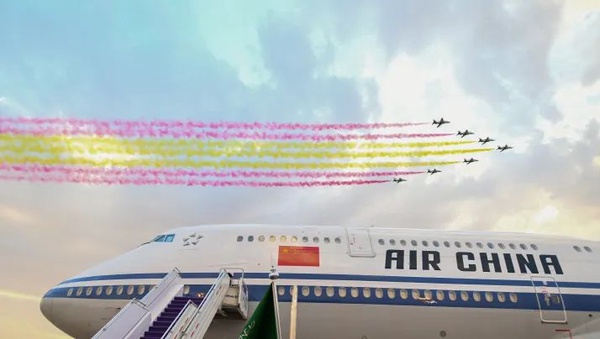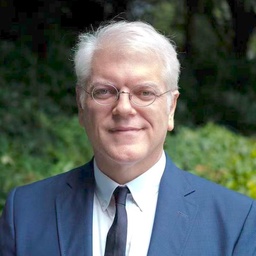观点摘要
长期以来,人们一直认为伊朗和沙特阿拉伯之间的差异主要是文明和意识形态上的。一方面,伊朗是八大古代文明之一波斯的现代化身,在阿契美尼德帝国(约公元前500年)的历史高峰期统治着今天的中亚,北非,欧洲,阿拉伯半岛的部分地区,当然,有些人称之为中东,另一些人称之为西亚。在其鼎盛时期,它是世界历史上最大的帝国之一,受到了包括亚历山大大帝等世界传奇人物的深深钦佩。
另一方面,沙特阿拉伯则是阿契美尼德帝国之后的1000多年内崛起并统治同一地区的另一个主要文明的现代化身。这个新文明随着伊斯兰教而崛起,伊斯兰教起源于阿拉伯半岛,它传播了阿拉伯语言和文化,从宗教影响了世界大部分地区,在政治上也留下了深刻的影响。伊斯兰教,对当代伊朗文化和政治仍然具有决定性意义。
马奥尼教授从两个方面(“新时代”和“再发现”)对「新时代的伊朗和沙特阿拉伯」进行了分析,参见全文。
Iran and Saudi Arabia in the new era
Jets release red and yellow smoke, the colors of the Chinese national flag, on December 7, 2022, after Chinese President Xi Jinping had arrived in Riyadh, Saudi Arabia, to attend the First China-Arab States Summit (XINHUA)
It has long been assumed that the differences between Iran and Saudi Arabia were primarily civilizational and ideological. On the one hand, Iran is the modern incarnation of Persia, one of eight distinct ancient civilizations, which at its historical peak during the Achaemenid Empire (ca. 500 B.C.) ruled parts of what is today Central Asia, North Africa, Europe, the Arabian Peninsula and of course, what some refer to as the Middle East and others call West Asia. At its height, it was one of the largest empires in world history, one deeply admired by the world beaters who followed, including Alexander the Great.
On the other hand, Saudi Arabia is the modern incarnation of another major civilization that would rise and dominate the same region and beyond a little more than 1,000 years after the Achaemenid Empire. This new civilization rose with Islam, which originated on the Arabian Peninsula, which spread Arabic language and culture and above all religion across much of the world, which politically would include for a time what is today Iran, and which left deep influences, like Islam, that remain decisive for contemporary Iranian culture and politics.
Despite the profound influence of Islam and Arabic in Iran, despite a shared political history, deep civilizational differences have persisted. These include linguistic differences, with most in Iran speaking Farsi. Furthermore, while Saudi Arabia is home to the two holiest cities of Islam, Mecca and Medina, the country is dominated by the Sunni branch of Islam, which has a longstanding theological conflict with the Shiite branch dominating in Iran. Furthermore, both modern states are theologically oriented, with the Saudi monarchy espousing the Sunni revivalist and fundamentalist movement called Wahhabism or Salafi, while the Islamic Republic of Iran employs a democratically elected government subordinate to a supreme leadership of senior Shiite clerics.
A new era
Today, as Chinese President Xi Jinping says, we live in a new era, one with changes unseen in a century. On the one hand, this generally refers to China's rise as a stable, well-governed, technologically advanced, middle-income country that serves as the largest trading partner of most countries in the world—one that supports a truly multilateral world by promoting peace and development based on the principles of mutual respect and non-interference, with key initiatives for global development and security, in tandem with recognizing and valuing civilizational differences. On the other hand, these advances coincide, unfortunately, with the opposite coming from the U.S.
The U.S., by contrast, is clinging to unilateralism and the global hegemony upon which its economy and society depend. It is a culture of violence that not only opposes a peaceful resolution to the conflict in Ukraine where the U.S. is fighting a proxy war against Russia, accompanied by ongoing American attempts to destroy the Russian economy through unprecedented sanctions, a practice the U.S. has long employed against Iran—not even relenting during natural disasters or the worst days of the pandemic. Indeed, such violence found a new target when a leading Iranian figure, Qasem Soleimani, was killed by a U.S. attack drone while he was visiting Iraq in 2020, reportedly to advance efforts to reconcile with Saudi Arabia.
When historians look back at this period of time, they will note 2020 especially. In addition to killing Soleimani, that was the year the U.S. convulsed socially, economically and politically as longstanding crises intersected as never before, culminating in America's catastrophic reaction to COVID-19. The very worst aspects of American society were magnified, devastating the American people but likewise creating a tremendous burden for the rest of the world.
These difficulties manifested in many different ways but they were "financed" so to speak by America's abuse of the global dollar hegemony. In short, the Federal Reserve increased the money supply by a historic 27 percent over 2020 and 2021, while the government provided more than $5 trillion in direct fiscal pandemic stimulus payments to citizens and businesses, swelling national debt to more than $31 trillion, while waging an unprovoked trade war against China, and putting in place a national strategy of energy independence, which many experts conclude has consolidated the American position of energy independence and its role as the world's top producer and consumer of fossil fuels.
Rediscovery
These developments were instrumental in causing the global inflation and instability that followed, setting the table in part for the conflict in Ukraine and wildly fluctuating energy markets in turn, all of which were against the interests of Saudi Arabia and Iran and most of the rest of the world, including Russia, China and the broader Global South.
In the meantime, the U.S. was demonstrating firstly with Donald Trump, secondly with Joe Biden, that it was an unreliable ally, one that explicitly put American interests above all others, one that would not hesitate to meddle in the affairs of friends and foes alike, and which above all was devoted in one form or another to advancing a new cold war paradigm that aimed to perpetuate U.S. hegemony by continuing to foster conflicts between countries like Saudi Arabia and Iran. In short, the U.S. was deeply resistant to the emergence of a new era and instead aimed to return to its illusory heyday of the 1980s and 90s, which it likes to recall as the latter part of the Cold War, when it was achieving its zero-sum fantasy of global domination amid Soviet Union collapse.
It's perverse to note that some pundits in the U.S. now describe America's efforts to destroy Russia through Ukraine as an opportunity to defeat the Soviet Union and finally win the Cold War once and for all, while these same people advocate a new cold war against China, and even fantasize about the "Ukrainization" of the Taiwan question. But such wishful thinking is not convincing to Riyadh, Brasilia or even Paris, among many other capitals, who are increasingly open to a post-dollar, post-American world, and who have turned their eyes toward Beijing, where greater shared interests related to trade and security beckon.
It's in these contexts that we must view China's Global Security Initiative, the remarkable achievement of helping Saudi Arabia and Iran restore diplomatic ties, and the proposals to mediate peace between Russia and Ukraine and Israel and Palestine.
As President Xi has said, world peace can begin in Asia and China can, and will, play a leading role to achieve it. Asia includes Iran, Saudi Arabia, Russia, and Israel, and China is the leading major country in Asia absolutely devoted to peace and a shared future for humanity, one that can accommodate and even celebrate civilizational and ideological differences as part of the rich tapestry of human experience, but likewise the only foundation from which we can work together to solve a number of existential problems facing all of us, including climate change, disease outbreaks and American hegemony.
This is what Iran and Saudi Arabia are rediscovering—that whatever their differences, what they have in common are even greater. This is why we have entered a new era of peace despite the old running dogs of war. This is why world leaders are coming to Beijing, despite American demonization. This is why we should be optimistic for the future and encourage the same for those facing war, poverty and underdevelopment.
来源|4月28日北京周报客户端
编辑|卢昱舟 全红



